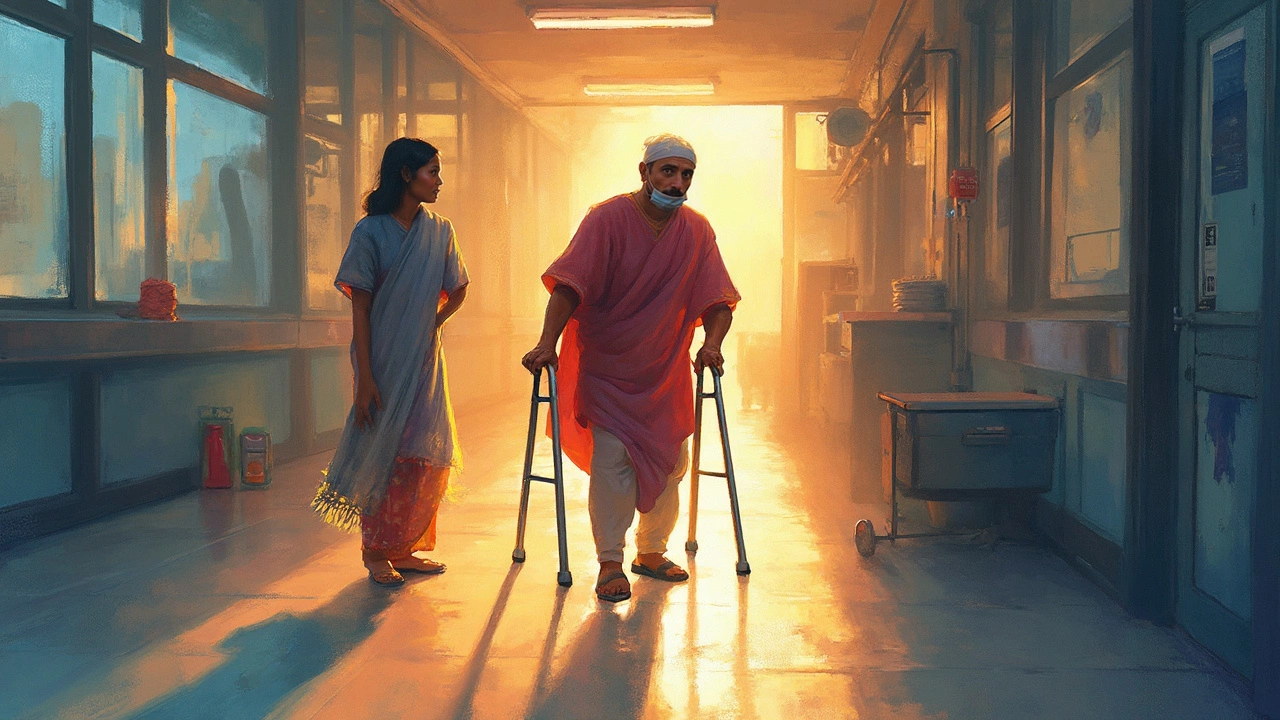Getting through open-heart surgery is a huge deal, and understanding what happens afterward can make things seem less daunting. So, you're probably wondering how long you'll be stuck in bed after the surgery. Well, it varies quite a bit! Generally, most patients spend a few days in the intensive care unit (ICU) before moving to a regular hospital room. During this time, you'll still have to take it easy, but you'll slowly start getting out of bed to sit in a chair or take short walks.
Now, how long you're actually bedridden can depend on several things, like your age, overall health before surgery, and any complications that might pop up. Some folks might feel up to moving around more quickly, while others need a bit more time to rest and recover. It's a personal journey, and no two recoveries are exactly the same.
One interesting fact? Studies have shown that getting out of bed and moving as soon as it's safe can actually speed up recovery and help prevent complications like blood clots. Of course, you'll want to pay close attention to your doctor's advice and listen to your body. After all, you're the one who's got to live with it, right?
- Immediate Post-Surgery Period
- Understanding Bed Rest
- Factors Affecting Recovery Time
- Role of Medical Team
- Tips for a Smoother Recovery
- When to Seek Additional Help
Immediate Post-Surgery Period
Right after the open-heart surgery, you'll find yourself in the ICU. It's the spot where the medical team keeps a close eye on you, ensuring everything's going smoothly as you start the recovery process. Generally, folks might spend anywhere from 24 to 48 hours here, depending on how the body's taking it all in.
What's the ICU All About?
The ICU is not some mysterious techie lab—it’s all about specialized care. This is where they monitor your heart rate, blood pressure, and breathing like a hawk. You’ll have a few tubes and wires connected, but don't worry, it’s normal. The goal is to catch any issues before they become problems.
Moving to a Regular Room
Once you're stable, the next step is moving to a regular hospital room. In the first few days post-surgery, they'll encourage a bit of movement to fast-track the recovery. Even a small thing like sitting up or dangling your feet off the bed can be a good start. It's about slowly gaining strength back without pushing too hard.
Paying Attention to Details
During these days, pain management is crucial. Nurses and doctors are there to help you manage discomfort and figure out the right balance so you can get some shut-eye and start healing.
Early Mobilization
Believe it or not, getting out of bed sooner rather than later can be a game-changer. It helps avoid clots, improves circulation, and even pumps up your energy levels. Of course, you'll want to get the green light from your medical team first.
| Days in ICU | Days in Regular Room |
|---|---|
| 1-2 | 3-5 |
Remember, the timeline may vary, depending on individual health conditions. But staying informed and engaged makes a world of difference in this recovery phase.
Understanding Bed Rest
The term bedridden might sound a bit intimidating, but understanding what it actually involves can give you some peace of mind. Right after your open-heart surgery, the body needs to take its time to start healing properly. This means lots of rest – both in bed and during light activity. But resting doesn't mean total immobility.
Once you're stable and out of the ICU, your medical team will encourage you to start small movements. It's important for the prevention of complications like pneumonia and blood clots. Nurses and physical therapists will be there, helping you sit up and eventually take short walks. These little steps, believe it or not, are crucial for your recovery.
What's the Typical Bed Rest Duration?
On average, you might spend a week or so in the hospital, with a big chunk of that time 'resting' while your body adjusts and heals. But don't be surprised if your doctor gives you the go-ahead to sit in a chair or walk a little sooner or later depending on how things are going.
Why Rest Matters
Rest is your body's natural way of rebooting. After the intense experience of surgery, rest helps your heart and other systems recover more quickly and effectively. However, too much rest can lead to other issues like muscle weakness and depression, so getting the timing right is key.
The Move to Active Recovery
Though the idea of staying bedridden frightens many, the transition to active recovery is a well-supported process. Hospitals often have detailed plans to ensure patients move around safely without pushing too hard too fast.
Factors Affecting Recovery Time
When it comes to recovery from open-heart surgery, several factors can influence how long you'll be bedridden and how quickly you'll get back to feeling like yourself. Let's break down some of these key elements.
Age and General Health
Your age and health before surgery can play a big role. Younger patients usually bounce back faster. If you went into surgery with strong physical health and no severe pre-existing conditions, expect a potentially smoother path to recovery. Older patients or those with underlying issues might need more time and care.
Type of Surgery
The specific kind of open-heart surgery you undergo also matters. A straightforward procedure might generally allow for faster recovery times compared to more complex surgeries. Your surgeon will give you a clearer expectation based on your specific situation.
Complications Post-Surgery
Complications, although rare, can extend recovery. Infections or issues with the incision can keep you bedridden longer than planned. Keeping a close eye on how you’re healing and keeping in touch with your medical team are key.
Lifestyle Choices
Do you smoke? Drink alcohol? These habits can slow healing. Sticking to healthy habits, like eating a balanced diet and avoiding smoking and alcohol, can help your body recover better and faster.
Family and Support Network
A strong support system can make a difference. Having family or friends to assist with daily activities and offer encouragement plays a crucial role in how well you recover.
While each individual's path post-surgery may differ, knowing these factors can help set realistic expectations and strategies for your own recovery journey.

Role of Medical Team
Your recovery process after open-heart surgery isn't something you go through alone. The medical team is crucial in making sure you get back on your feet safely.
Surgeons and Doctors
Your surgeon is the lead player here. They know your case inside and out. After the procedure, they'll outline what you can expect and tailor your recovery plan based on how things went during surgery and your overall health.
Nurses and ICU Staff
In those first few days post-surgery, nurses and ICU staff are your go-to crew. They check your vitals, manage any pain with medication, and make sure you're comfortable. Listening to them is key for spotting early signs of complications.
Physical and Occupational Therapists
These folks are there to help you move again. They'll create exercises tailored just for you to improve your strength and get your blood flowing. Here’s a hot tip: starting with a simple task, like sitting up on the edge of your bed, can make a world of difference to beat the initial bedridden phase.
Nutritionist
Next up is the nutritionist, who plans a diet that suits your body's needs. Eating well can speed up your recovery and improve your heart's health long-term. So, their input is more important than most people think.
| Medical Role | Focus |
|---|---|
| Surgeons | Create personalized recovery plans. |
| Nurses | Monitor vitals and manage pain. |
| Therapists | Guide physical recovery exercises. |
| Nutritionists | Provide tailored dietary plans. |
Every member of your team works together, focusing on different aspects of your recovery. They’re the bridge between the hospital bed and your real bed at home. Keep an open line of communication with them—you’re a team now!
Tips for a Smoother Recovery
Recovering from open-heart surgery can feel like a marathon, not a sprint. But don't worry, there are plenty of ways to help speed up the process and get you back on your feet sooner.
Listen to Your Medical Team
The first rule of thumb? Listen to what your doctors and nurses tell you. They know their stuff and they're a crucial part of your recovery. Follow the physical activity guidelines they provide, and make sure you understand any restrictions you need to keep in mind.
Pace Yourself with Physical Activities
You might feel eager to do too much too soon, but taking it slow is key. Start with short walks around your house — even if it's just to the kitchen or bathroom — and gradually increase the distance as you feel stronger. But remember, patience is your best friend right now!
Stay on Top of Your Meds
Heart meds can feel like a chore, but they're super important in regulating your heart's performance post-surgery. Keep a schedule to make sure you’re taking them on time. If you notice any nagging side-effects, don’t hesitate to report them to your doctor.
Nutrition is Your Ally
Eating well isn't just a cliché — it's essential after something like open-heart surgery. Include lean proteins, whole grains, and lots of fruits and veggies in your diet. Hydration is also crucial, so keep that water bottle handy. You're building a foundation for a healthier heart right here!
Signs You Shouldn't Ignore
Be aware of warning signs like unusual shortness of breath, swelling in your legs, or any new chest pain. If something doesn’t feel right, it's better to ask and be safe rather than sorry.
Check in Regularly
Your recovery journey includes several follow-up appointments. Don’t skip these! They're your perfect chance to talk things through with your doctor and make sure everything’s on track.
| Recovery Timeline Overview | |
|---|---|
| ICU Stay | 2-3 days |
| Hospital Stay After ICU | 3-5 days |
| At-Home Recovery | 6-12 weeks |
By taking these steps and focusing on your recovery, you'll be on your way to feeling like yourself again. Just remember, healing doesn't happen overnight, but every small step counts!
When to Seek Additional Help
So, how do you know when it's time to reach out for extra help post-surgery? It's crucial to keep an eye on both physical and emotional signs during your recovery.
Watch for Physical Symptoms
After open-heart surgery, changes in your condition can be swift. Keep an eye out for these red flags:
- Fever over 101°F: This could hint at an infection.
- Unusual trouble breathing: More than expected shortness of breath needs attention.
- Irregular heartbeat: If your heart’s off-beat or racing, it’s time to call the doctor.
- Increased leg swelling: This might indicate a clot.
- Chest pain: That sudden, sharp pain? Best not to ignore it.
Emotional Well-being Matters
Mental health often takes a backseat, but it’s just as important. If you’re feeling consistently down or anxious, talk to your doctor. They might recommend speaking to a counselor who understands the toll open-heart surgery can take.
You’re Not Alone
Remember, recovery isn't just about the physical side. Your medical team is there to help, so don’t shy away from reaching out. Whether it’s your surgeon, GP, or the nursing staff, they can provide guidance and reassurance.
Handy Helplines
Many areas have support groups and helplines specifically for cardiac patients. These can offer advice and connect you with others who've been through heart surgery. Sometimes, just knowing you’re not alone makes all the difference.



